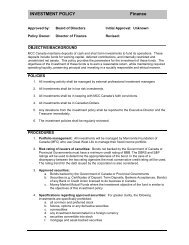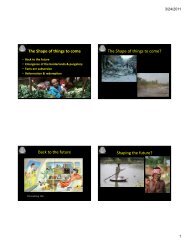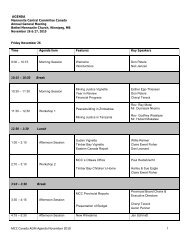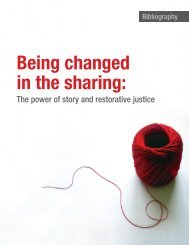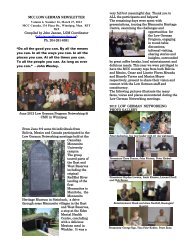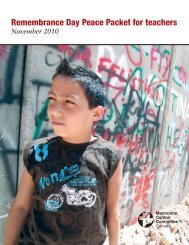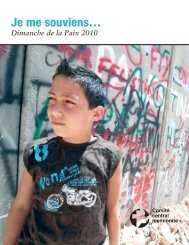Walking together: Healing and hope for Colombian refugees
Walking together: Healing and hope for Colombian refugees
Walking together: Healing and hope for Colombian refugees
Create successful ePaper yourself
Turn your PDF publications into a flip-book with our unique Google optimized e-Paper software.
Promoting Restoration from<br />
Refugee Trauma<br />
UNDERSTANDING REFUGEE<br />
TRAUMA<br />
As victims of war, torture <strong>and</strong> human rights abuses,<br />
<strong>Colombian</strong> <strong>refugees</strong> have often experienced<br />
considerable trauma. Just as trauma effects a person’s<br />
mental <strong>and</strong> emotional well being, trauma can <strong>and</strong> does<br />
affect how <strong>refugees</strong> interact with <strong>and</strong> adapt to their<br />
receiving community. At the same time, <strong>Colombian</strong><br />
<strong>refugees</strong> are people of great resilience, strength <strong>and</strong><br />
courage <strong>and</strong> have potential not only to recover from the<br />
effects of their past experiences but to grow in new <strong>and</strong><br />
meaningful ways. When considering refugee trauma, it<br />
is useful to begin by differentiating the following three<br />
concepts: stress, trauma <strong>and</strong> resilience. 17<br />
The word stress is used to refer to any outside <strong>for</strong>ce<br />
or event that has an effect on the body, mind or<br />
emotions. We also use the word stress to refer to the<br />
automatic physical, mental or emotional response to<br />
these events. Stress - both the event <strong>and</strong> the reaction<br />
- is a normal part of life <strong>and</strong> can be neutral, positive<br />
or negative. A healthy level of stress encourages<br />
productivity <strong>and</strong> creativity <strong>and</strong> leads to a sense<br />
of well-being <strong>and</strong> satisfaction. Too much stress is<br />
overwhelming, causing frustration <strong>and</strong> distress. Stress<br />
that builds up over time is known as accumulated or<br />
compounded stress, <strong>and</strong> can cause general anxiety,<br />
depression <strong>and</strong> even burnout.<br />
<strong>Colombian</strong> <strong>refugees</strong> share their<br />
experiences dealing with the<br />
effects of trauma after arriving in<br />
Canada:<br />
“Here you really keep your<br />
memories to yourself. At times it<br />
seems as though you have lost your<br />
memory. Sometimes I don’t think<br />
about those memories <strong>for</strong> many<br />
days. Other days the memories<br />
come back to you <strong>and</strong> it’s like living<br />
them all over again. The “memory<br />
loss” doesn’t last very long - but<br />
those moments (when you are not<br />
thinking about your past) - are<br />
really cool. You feel good when<br />
you are not thinking about the<br />
memories of what you have lived.”<br />
- Sara<br />
“Sometimes it’s difficult because it is<br />
still...sometimes it seems like it was<br />
just yesterday. I still don’t know how<br />
to cure that. Every so often I feel<br />
nostalgic, it hits me hard <strong>and</strong> causes<br />
me stress.”<br />
- D o r a<br />
17. Definitions of stress, trauma <strong>and</strong> resilience adapted from the Strategies <strong>for</strong> Trauma Awareness <strong>and</strong> Resilience (STAR) Program,<br />
Eastern Mennonite University, Virginia, USA. www.emu.edu/star



